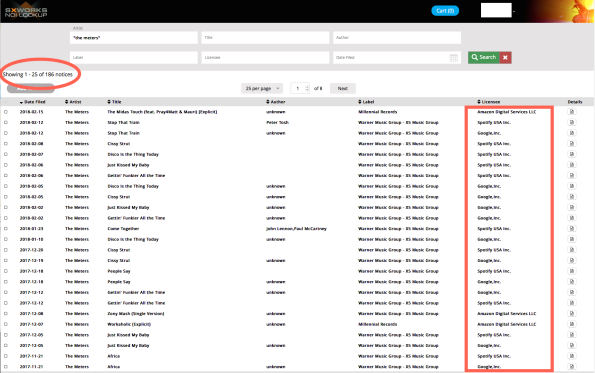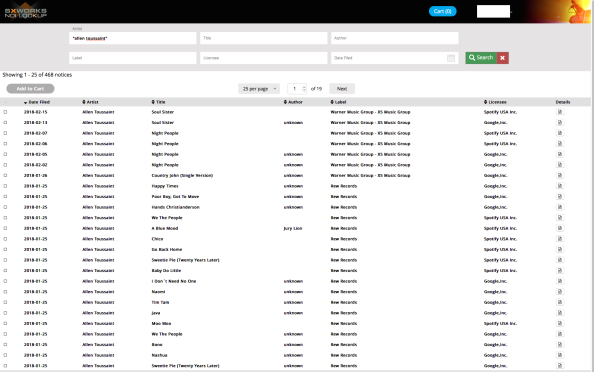Spotify, Google, Amazon ‘Can’t Find’ Neville Brothers, Other NOLA Songwriters
"Address Unknown" Notices Of Intent has been a problem in the music industry for some time, with music streamers and big tech companies dodging royalty payments in over sixty million instances. Chris Castle looks at how NOIs have impacted New Orleans songwriters, and what SoundExchange is doing about it.
___________________________
Guest post by Chris Castle of Music Technology Policy
MTP readers will be familiar with the morass known as the “address unknown” mass NOIs, the loophole in the 1976 Copyright Act that Big Tech companies like Spotify, Google and Amazon have been leveraging for nearly two years. This loopholeapalooza has resulted in well over 60,000,000 notices filed by these whingers with the U.S. Copyright Office–giving the biggest companies in commercial history a free ride on mechanical royalties otherwise payable to songwriters and music publishers. You read that right–SIXTY MILLION NOIs.
That’s right–it’s not that the royalty is deferred or paid retroactively. The royalty is never paid. It must be said that the reason this royalty is taken from songwriters and publishers is because the Copyright Office (and the Congress) allows these filings to happen, indeed makes it easy for it to happen. They do this while they take months to “examine” the very copyright registrations that would prevent the royalty free “license” ever coming into existence, yet accept millions of “address unknown” uncritically. (For a more complete background on this absurdity, see my article on the subject from the American Bar Association Entertainment & Sports Lawyer.)
This is important for a number of reasons–and as I will show, affects songwriters at both ends of the food chain from the most played like Ed Sheeran and Bruno Mars to some of our most important classic artists like Rebirth Jazz Band, The Neville Brothers, New Orleans Nightcrawlers and the Hot 8. This is particularly relevant to me as we remember many of these players who came to Austin during the storm. Je me souviens.
Not only does the Copyright Office uncritically accept these “address unknown” NOIs for our most vital songwriters, they also post them in a manner that makes the posting essentially unusable. Each NOI is posted separately in massive compressed files, so no individual songwriter is likely to be able to decompress and index them to even know if their song is included, correctly or incorrectly. This takes looking the other way to a whole new level.
Thankfully, SoundExchange has created a searchable index of all the “address unknown” NOIs that have been filed as of a few weeks ago, which I imagine will be updated from time to time as the Copyright Office posts about 50,000 a week. (See SX Works NOI Lookup if you want to see if your songs are in there.) As Andrew Orlowski has reported in The Register, Spotify claims not to be able to find Ed Sheeran–the most streamed artist on Spotify for 2017. I have analyzed in a Trichordist guest post the Top 5 songs on the Billboard Hot 100 since January 1, 2018 (the day that the despised safe harbor begins in the controversial Music Modernization Act), but now let’s see if we can find some of the well-known New Orleans artists and songwriters in the NOI Lookup.
The Neville Brothers? 222 Neville songs across Spotify, Google, Amazon and iHeart.

The Meters? 186 songs also “licensed” by Spotify, Google, Amazon.

Allen Toussaint? Oh yes.

Preservation Hall Jazz Band? 250 songs to Google, Spotify and Amazon.

And it goes on and on and on. Remember–these are free licenses.
I want to emphasize that this loophole rip off is being done to artists from all over the country and indeed from all over the world, and that the Copyright Office is letting them get away with it.
The Music Modernization Act does not solve this problem–it just sweeps it under the rug. Solving this problem would involve confronting Big Tech head on and it seems that the only people who are willing to do that are the songwriters and publishers like David Lowery, Melissa Ferrick, Bob Gaudio, Wixen Music Publishing and Bluewater Music Publishing who bring these cases against companies like Spotify. You know “the litigation” that has created such a problem what the world needs is the Music Modernization Act.
Trust me–that legislation will not help all the songwriters who have been blatently stiffed by Big Tech once again.